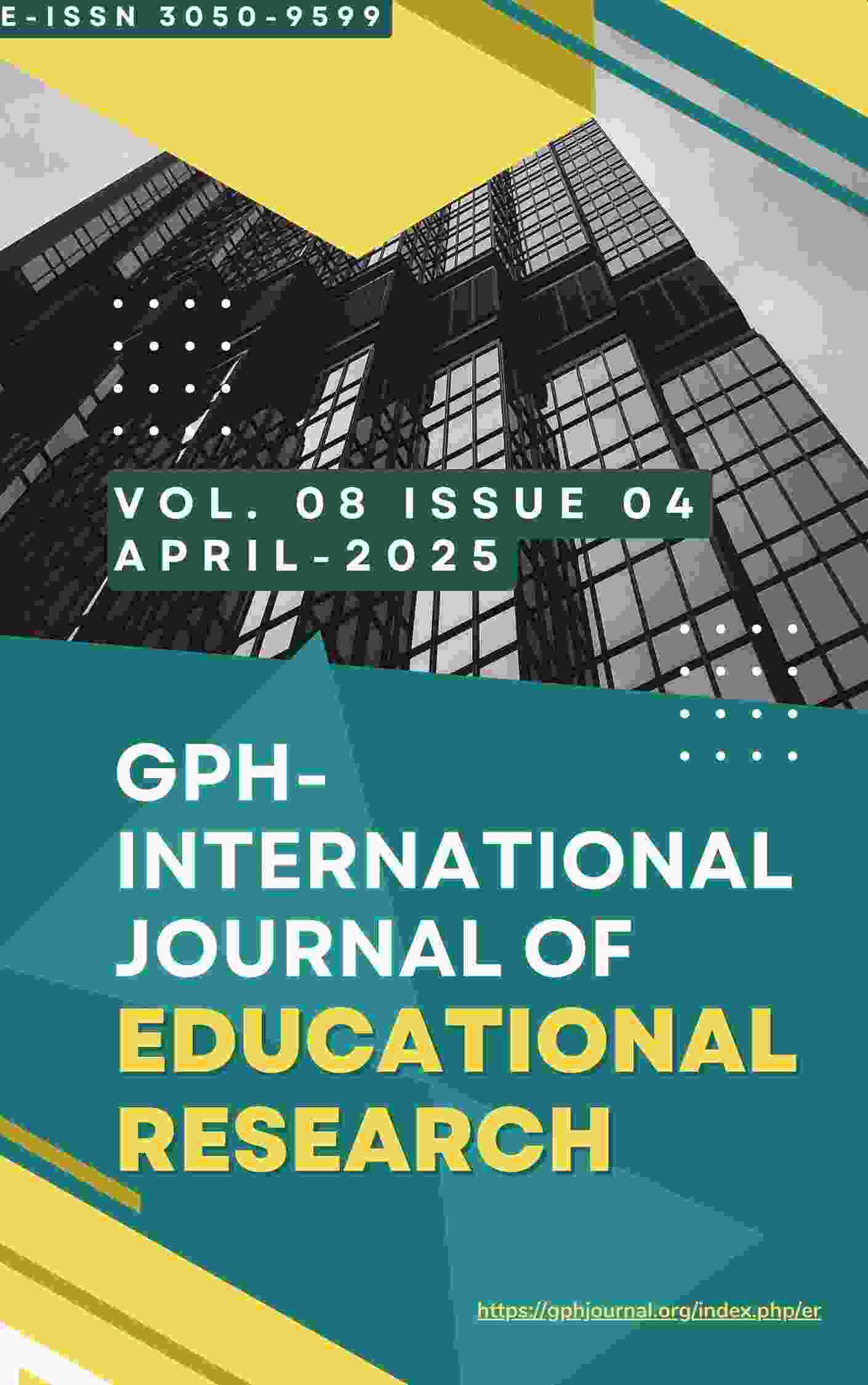The Exploring AI capacity building programs in Nigerian higher education institutions: A study of curriculum design, faculty competence, and student engagement
Abstract
Artificial Intelligence (AI) is transforming education globally, necessitating the integration of AI capacity-building programs in higher education institutions. This study explored the state of AI capacity building programs in Nigerian higher education institutions, focusing on curriculum design, faculty competence, and student engagement. A descriptive survey research design was adopted, and data were collected using a structured four-point Likert scale questionnaire. The population of the study comprised 79,668 staff from federal and state universities in Nigeria. the sample size for the study consisted of 7,967 staff from selected universities in Nigeria. A structured questionnaire duly validated with reliability index of 0.80 was used for data collection. Data analysis was conducted using mean and standard deviation, with a criterion mean of 2.50 for decision-making. Findings revealed that AI curriculum integration is moderate, with limited interdisciplinary adoption and infrequent periodic reviews. Faculty members demonstrated low AI competence due to inadequate training and expertise, while student engagement in AI learning was moderate, characterized by active participation in AI projects but restricted access to AI research opportunities. The major challenges hindering AI education included insufficient funding, inadequate faculty expertise, and a lack of AI infrastructure. The study recommended increased funding, faculty training, interdisciplinary AI curriculum development, enhanced student research opportunities, industry partnerships, and regular curriculum reviews. These measures will help improve AI education in Nigerian universities and enhance the country’s competitiveness in the global AI landscape.
Downloads
References
Adebayo, T., & Okonkwo, P. (2022). The state of artificial intelligence education in Nigerian universities: Challenges and prospects. Journal of Emerging Technologies in Education, 15(2), 45-60.
Adegbite, R. (2023). Student engagement in artificial intelligence education: A case study of Nigerian universities. African Journal of Educational Technology, 18(1), 89-102.
Adegbite, T. (2021). AI education in Africa: Challenges and opportunities. Journal of Educational Technology, 12(3), 45-60.
Ajayi, O., & Lawal, M. (2023). Strategies for enhancing AI education in Africa: A focus on faculty development and industry collaboration. International Journal of Artificial Intelligence Research, 11(4), 120-135.
Balogun, T., & Ijeoma, C. (2024). The role of industry partnerships in advancing AI education in Nigeria. Technology and Higher Education Review, 22(3), 77-91.
Chen, L., & Zhao, Y. (2021). Assessing the validity of AI education research instruments. Journal of Educational Measurement, 58(3), 245-261.
Chukwuma, V., & Bello, S. (2022). Analyzing student participation in AI projects: A Nigerian perspective. African Journal of Science and Innovation, 9(2), 55-70.
Eze, J., & Akinola, R. (2023). AI curriculum integration in Nigerian higher education: Progress and challenges. Journal of Educational Reform in Africa, 17(1), 33-49.
Garcia, R., Kim, S., & Patel, M. (2023). Reliability analysis in AI education research: A methodological review. International Journal of Educational Research, 102, 101-119.
Ibrahim, K., Yusuf, B., & Adamu, L. (2023). Faculty preparedness for AI education in Nigerian universities. Journal of Digital Learning and Teaching, 12(3), 101-116.
Iroriteraye-Abeke, J.I.(2022). Interactive Radio Response (IRR) Effectiveness in Small Class Size Chemistry Achievement. Journal of Education, Society and behavioral science. 35(3), 32-38.
Iroriteraye-Abeke, J.I.(2022). Blended Teaching Methodology for Quality Assurance in Education for Adults and Youths of Basic Education System in Nigeria. Research in Education. 18(1), 138-142
Johnson, T., & Brown, P. (2022). AI integration in higher education: A survey-based approach. Journal of Digital Learning, 20(4), 301-315.
Kuhl, N., Goutier, M., Hirt, R., &Satzger, G. (2021). The AI Learning Framework: A Conceptual Framework for AI Education. Computers & Education, 160, 104025.
Li, X., Chen, Y., & Zhang, L. (2021). Student engagement in AI learning: A global perspective. Computers & Education, 175, 104314.
Luckin, R., Holmes, W., Griffiths, M., & Forcier, L. B. (2018). Intelligence Unleashed: An Argument for AI in Education. Pearson Education Report, 1-42.
Martinez, D., & Lee, K. (2024). Statistical methods for evaluating AI curriculum effectiveness. Educational Data Science, 15(1), 89-105.
Miao, F., Holmes, W., Huang, R., & Zhang, H. (2021). AI and education: Guidance for policymakers. UNESCO Report, 1-97.
Mishra, P., & Koehler, M. J. (2006). Technological pedagogical content knowledge: A framework for teacher knowledge. Teachers College Record, 108(6), 1017–1054.
Okeke, F., & Nwafor, I. (2021). Challenges of AI adoption in Nigerian universities: Funding, infrastructure, and policy gaps. Nigerian Journal of Higher Education Research, 14(2), 75-90.
Okonkwo, C., & Eze, J. (2022). Faculty competence and AI teaching in Nigeria. Nigerian Journal of Higher Education, 20(1), 89-104.
Olaleye, B. (2023). Barriers to AI Education in Nigeria. African Journal of Digital Learning, 8(1), 27-45.
Olaleye, T., & Olatunji, M. (2021). Assessing faculty competence in artificial intelligence: A survey of Nigerian universities. Journal of Educational Technology and Innovation, 19(3), 65-81.
Oyovwi, J.I. &Iroriteraye-Abeke, J.I.(2022). Effect of Meta-Cognition on Students Academic Achievement and Retention Level in Science Curriculum Content. Psychology and Education. Research in Education. Psychology and Education. 58(4)4932-4939
Uche, M., Chinedu, P., & Adeyemi, O. (2022). The state of AI education in Nigerian universities. West African Journal of Education, 14(3), 66-80.
Williams, J. (2023). Faculty competence and student engagement in AI courses: A case study. Higher Education Research, 12(2), 112-128.
Yusuf, A., & Adebisi, O. (2022). AI infrastructure and resource allocation in Nigerian higher education: An assessment of current challenges. West African Journal of Higher Education, 16(4), 112-128.
Zawacki-Richter, O., Marín, V. I., Bond, M., & Gouverneur, F. (2019). Systematic Review of Research on AI in Education. International Journal of Educational Technology in Higher Education, 16(1), 39.
Author(s) and co-author(s) jointly and severally represent and warrant that the Article is original with the author(s) and does not infringe any copyright or violate any other right of any third parties, and that the Article has not been published elsewhere. Author(s) agree to the terms that the Global Publication House will have the full right to remove the published article on any misconduct found in the published article.























